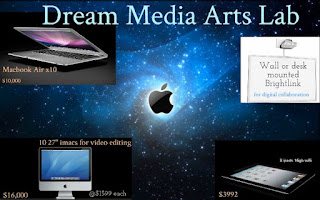 |
| Redesigning media arts to create, not consume |
The Macs in our media arts lab are getting old and plastic. They can't push the high-def video coming out of our latest cameras, so it's time for a hardware upgrade, but it's not just about the hardware.
One of the biggest problems we face in our static, desktop centred lab with ordered rows of imacs are the bad habits students fall back into. Because our lab is like every other lab in the school (factory like rows of desktops in Pink Floyd The Wallesque rows of conformity), students do what they usually do in a computer lab; they zone out and become passive media consumers. Passive TV viewing has evolved into passive computer use.
In a media arts class where they are supposed to be in a creative, active mind-space, this is an ongoing class management headache. Battling the Facebook zombies and youtube droolers becomes an ongoing headache in the typical computer lab, especially with the weakest students who tend to be the most non-experimental and habitual in their technology use.
I've looked at this from a typical school IT/lab point of view, advocating for a mini-lab concept that emphasizes diversified, mobile technology, but this is the media-arts angle.
Many of the ideas are similar, but the idea of mobile, adaptable media tools also spurred the realization that students in front of an online desktop act much the way that students in front of a television do; they become passive, unquestioning media consumers. In a media arts lab this is an ongoing crisis.
There is the culture of entertainment that most digital natives subscribe to. Computers with internet access are toys to be used for entertainment. Their habitual use of computers at home and throughout their school careers have only enforced these bad habits. Unfortunately, those habits extend to most educators too. From PD days where the presenter assumes that if you're on a computer you're not paying attention, to teachers booking labs to have a period off, computers aren't considered anything other than an entertaining distraction by just about everyone.
We then get them into media arts where they are creating large amounts of digital media, and most of them are trapped in their bad habits and social expectations of technology. The fact that school related computer lab time is often unsupervised only adds to the problem.
Trying to break them out of that rut in a room with rows of desktops isn't working. Time to free up the tech, and break the passivity.
